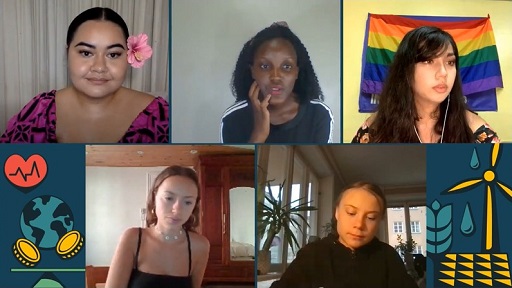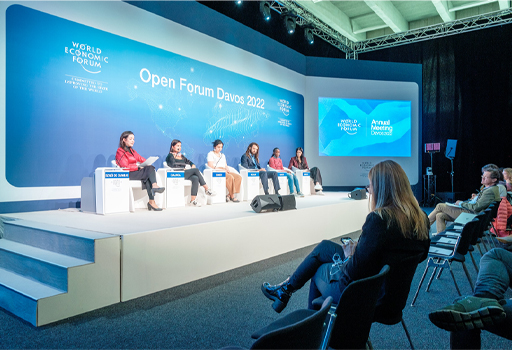3.3 Case study: Vanessa Nakate
Vanessa Nakate was the first Fridays for Future climate activist in Uganda, rising to the occasion as she felt African people need to have their voices heard:
But while the African continent is on the front lines of the climate crisis, it is not on the front pages of the world’s newspapers. There is so much that needs to be done to hold the Global North responsible for the climate crisis.
Vanessa founded the Rise Up climate movement and was one of the leaders of a campaign to save the Congo rainforest. She also founded the Youth for Future Africa Facebook group.
In an interview in April 2022, Vanessa explained her motivation:
I was speaking with my friends and they told me they didn’t feel a part of the movement because, at the time, the media was reporting on the climate strikes as organized and led by and for teenagers. Most of my friends were either finishing university or they had already graduated. I suggested we continue to organize strikes, but call ourselves Youth for Future instead. It worked – people joined from various different locations and started sharing information on social media. Soon after, we changed the name to Rise Up movement. This became a way for us to platform and amplify voices from the African continent because of the challenges African activists face to have their voices heard and listened to in climate spaces.
During this interview, Vanessa reflected on what young activists could be doing to represent their own communities:
The first is ensuring that the voices of those on the front lines are platformed. We need to tell our own stories. We need to document our own experiences and what is happening in our communities. That is one of the ways we can ensure that what is happening on the ground is listened to – it doesn’t just become statistics. Climate change is more than statistics. It’s more than data points. It’s about the people.
Vanessa provided an example of the sorts of initiatives she and her friends were taking part in:
One example is the One Tree UG Project, led by Evelyn Acham Omonuk which involves planting fruit trees and giving out food trees to different households. There is also the Girl On The Move Project, led by Isaac Ssentumbwe, a skills development programme for women and girls, especially those who have difficulty finishing school. We know that one of the ways to tackle the climate crisis is educating girls and empowering women. Another is, of course, climate education. And that is also something we are working on within Rise Up. We’ve reached out to a number of schools in Uganda to install solar panels and eco-friendly cook stoves. So far, we’ve finished installations in 17 schools.
Vanessa has used public stages such as COP25 and COP26 to call on governments to take immediate action and raise international awareness of the African struggle. At time of writing this course COP28 was imminently being held in Dubai, and Vanessa Nakate had been publically sceptical about the likely outcomes of the conference. If you have time and want to find out more, this video of a conversation between Vanessa Nakate and Wopke Hoekstra (European Commissioner for Climate Action) [Tip: hold Ctrl and click a link to open it in a new tab. (Hide tip)] gives more details about Vanessa’s concerns.
In the following activity, you’ll watch two extracts from a panel held at the Global Just Recovery Gathering in April 2021, where people around the world came together to collectively reimagine the future. The three-day online event featured interactive workshops, cultural sessions and hands-on training. The panel features young activists Brianna Fruean (Samoa), Vanessa Nakate (Uganda), Rey Valmores-Salinas (Philippines) and Greta Thunberg (Sweden).
Activity 5 Vanessa Nakate’s activism
Part 1
Watch the video, in which Vanessa Nakate discusses her activism in two extracts from the panel recording. Note down the points that she makes about:
- what motivates young people to act
- the challenges a young activist can face
- how she manages those challenges.

Transcript: Video 1 Vanessa Nakate speaks at the Global Just Recovery Gathering 2021
Part 2
Consider the following questions and make notes about your responses.
- How could such a video be used in climate crisis-related teaching, with different age groups in different locations?
- How might the stories of young climate activists’ experiences be used effectively in climate education?
Part 3
Conduct a brief online search for resources about climate activists in your own country and/or stories which might particularly inspire discussion among learners in your own context. Note how easy it was to find relevant resources, and any which look particularly useful for supporting teaching in your setting.

